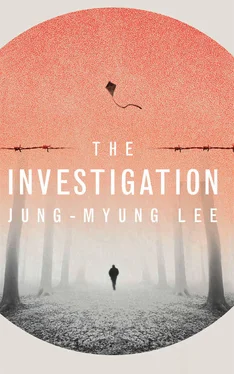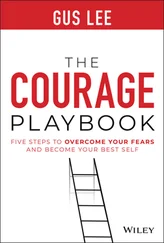I was summoned to the warden’s office. I stood at attention in front of his desk for an eternity, but he didn’t look up from his newspaper blaring the headlines ‘All Schools from Primary School to University Will Become Military Schools’, ‘Army Ministry Reforms Military Service Law Regarding Early Conscription’. They’d lowered the conscription age once again; it was now fifteen. All people talked about was national resistance. Finally Hasegawa folded the newspaper and placed it on his desk. He looked at me with the dignity of a lion. ‘I received the letter from Manchuria.’
I was trembling like a frail antelope. ‘I had no choice,’ I murmured defensively. ‘I am to review all incoming and outgoing post.’
Of course, we both knew that exceptions existed for all regulations; I should have sent the post addressed to the warden without opening it. This time the performance of my duties was tantamount to a declaration of war.
Hasegawa maintained his calm with effort. ‘I’m not finding fault with you. You were right to be faithful to your duties.’
I’d expected him to shout at me; now I felt all the more nervous.
Hasegawa slowly added tobacco to his pipe and tamped it down with his thumb. ‘I called you here because there’s something you need to know.’
My heart thumped. He wouldn’t hide or avoid anything now; I wanted to be done with all of this. ‘Yes, sir. There are things I’ve been seeking to understand.’
He lit his pipe. He sucked in loudly a few times; smoke curled up to the ceiling. ‘Well, what is it that you want to know?’
‘All I know is that there’s something going on in this prison that shouldn’t be.’
His features stiffened. I felt an eerie chill.
‘Nothing’s going on that shouldn’t be happening,’ he said. ‘What are you referring to?’
‘The doctors in the infirmary are conducting human experiments on healthy Korean prisoners. They—’
‘What is it that you really want to know?’ he barked.
‘Is Choi still alive?’
Hasegawa’s eyebrows furrowed. He sucked deeply on his pipe and let out a plume of white smoke. He nodded.
Dozens of questions collided with one another in my head, but I managed to bleat out only one. ‘How?’
The warden gazed at the smoke trailing upwards. He tapped his pipe on the ashtray. He sucked a few more times on the empty pipe. ‘For the Empire. I kept him alive for the Empire.’

When Choi arrived at the prison, rumours about the man who’d hurled a bomb at the Emperor raced around the prison. But Choi kept to himself, his mouth sealed. He paced the prison yard like a caged wild beast. The very day the warden arrived at Fukuoka, he watched Choi from behind the white curtains in his office. Hasegawa could tell that Choi still reeked of conspiracies, even when he didn’t say a word and was just sitting in the sun by himself. Hasegawa wanted to know what Choi was plotting. He tasked Kim Man-gyo with watching Choi and ordered him to report back. The following day Choi was moved into Kim’s cell. Outgoing and affable, Kim gained Choi’s trust quickly by procuring hard-to-find goods and providing him with information from the guards.
Soon Kim relayed a rumour that Choi had left an enormous treasure in the hills of Manchuria. Eyes glinting, he reported that the prisoners claimed that Choi, who had led a fairly large brigade of independence fighters before coming to Japan, had attacked a Kwantung Army supply unit that held the military chest for Manchuria. Choi had apparently hidden the gold in a secret location before smuggling himself into Japan. Hasegawa laughed. It was preposterous. A ragtag bunch of bandits couldn’t possibly defeat a Kwantung Army supply unit. And why would this Choi bury mounds of gold and leave his riches, to go back into the danger of war?
But then Choi attempted to break out of prison. Already a regular in solitary, he pushed a guard aside in the yard and sprinted towards the wall. Hasegawa took it upon himself to interrogate Choi personally, after he’d been beaten beyond recognition. Hasegawa looked greedily into his swollen eyes. ‘It’s General Choi, I hear? Why did you try to escape?’
‘Escape is the number-one duty of a soldier in captivity.’
Hasegawa struck Choi’s cheek angrily with his baton. ‘You’re not a soldier or a prisoner of war. You’re just a criminal. You weren’t trying to escape, you were trying to die.’
‘It doesn’t matter. If dying is the only way I can get out of here, then that’s what I’ll do.’
‘Fearless, aren’t you? Why is that?’
‘There’s something I need to do.’
Hasegawa suddenly remembered the rumour. What if Choi actually had stolen the Empire’s military chest? If he recovered it, that achievement would be truly unsurpassed. Hasegawa’s temples began to throb. He couldn’t be impatient; he had to bide his time until he was certain. He twisted his moustache. ‘I should execute you for attempting to escape. But just this once, I’ll look the other way. You’re going to solitary for a fortnight. If you do something stupid like this again, I promise you’ll be riddled with bullets next time.’
But soon after Choi was released from solitary he attempted another escape. This time, he’d lain in the drain along the wall. A guard on his rounds discovered him immediately. The warden interrogated him a second time. It was the same thing all over again. Choi insisted there was something he had to do. Hasegawa sent him back to solitary. Choi escaped and tried to climb over the wall. Again, Hasegawa sent him to solitary. The two men continued this endless game of cat-and-mouse. The fourth attempt resulted in Choi hiding in the back of a lorry scheduled to ship out bricks made in the prison workroom. Hasegawa stopped the lorry and had all the bricks unloaded; Choi, covered in dust, rolled out and sprinted desperately towards the gates. The guard positioned at the watchtower aimed the machine gun at his back, watching the warden’s hand. If the warden lowered his hand, he was to shoot. Hasegawa instead gave the guards around him a look. The guards took out their clubs and went after Choi. Practically a corpse, he was now dragged yet again into the interrogation room. Hasegawa looked down at him. Why did this prisoner keep trying to escape in such desperate ways, when he knew his life was on the line?
‘Why do you keep doing this?’ Hasegawa asked.
Choi didn’t answer.
Hasegawa looked round to make sure they were alone. ‘You won’t say it yourself, so I’ll say it. The reason you’re trying to escape so desperately is not because of a prisoner-of-war’s duty, or for the independence of your sorry country.’
‘Then why?’
‘Because of money. The enormous amount of gold you hid somewhere in Manchuria.’
Choi raised his swollen eyes. ‘What are you talking about?’
‘I looked through some files at the Army Ministry. There is a record of an anti-Japanese surge in Manchuria in the mid-1930s. In 1936 some Korean independence and Communist elements attacked the supply unit of the Kwantung Army. We beat them, but suffered significant loss of life and goods.’
‘Are you saying there are records about gold being stolen?’
Hasegawa shook his head. ‘It was wartime. The military wouldn’t have revealed the amount of loss. If they had lost a large portion of the military chest, the person responsible for the platoon and several others would have been shot dead. It’s the basics of war propaganda. You diminish setbacks as much as possible and exaggerate any victory.’
‘What makes you think that the gold was stolen?’
Читать дальше













